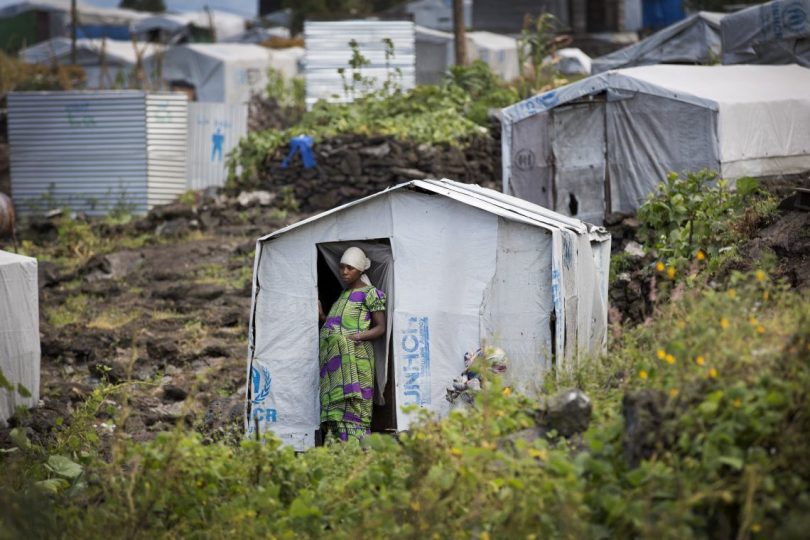The COVID-19 pandemic is now reaching parts of the world already experiencing significant humanitarian emergencies. People in camp settings, temporary shelter and urban environments may be particularly vulnerable as poverty, population density and displacement can make social distancing measures difficult.
Responders are preparing for the worst in places where the majority of the population have limited access to sanitation – over the past year refugee camps across the globe did not have enough water to meet basic sanitation and hygiene needs – and where social distancing is challenging. Under these acute circumstances, it is vitally important to ensure these preparations take into account the specific vulnerabilities of women, girls, men and boys, and support local leadership and community resilience.
How bad could COVID-19 be for women, girls and vulnerable people in humanitarian settings?
In short, very bad. Gender inequality increases the impact of the disease on girls and women. While current data indicates COVID-19 mortality is higher in men than women, women carry the majority of the healthcare burden and caregiver responsibilities for children, the elderly and sick. Women and girls are often responsible for providing clean water and sanitation for their families, but may have their own sanitation and menstrual hygiene needs overlooked.
We know from experience that as health emergencies ramp up, maternal and reproductive health services are interrupted. Women who are due to give birth in the next few months may not be able to access the care they need safely. Social isolation measures will restrict access to community gardens and markets and decrease women’s independence and ability to earn essential income. Rising food insecurity can also disproportionately increase the risk of malnutrition for women and girls.
We also know that women make up the majority of the health workforce responding to COVID-19 and are often primarily responsible for water and sanitation for their household, but make up a small portion of leaders in these sectors (in WASH women are only 16% of the professional workforce, with a lower number in leadership; in health women make up only around 20% of leadership). Consequently, these services fail to benefit from their skills and knowledge and may not consider the needs of women and girls in addressing the pandemic.
The risk of sexual and gender-based violence is increasing globally due to COVID-19, and humanitarian emergencies are no exception. Existing gender inequality may be exacerbated by increased isolation, loss of income and decreased access to support services. This combination can heighten the risks of abuse, violence and exploitation and increase controlling or harmful behaviour such as domestic violence, early marriage and trafficking. Child protection issues may also be exacerbated during the pandemic. For many children in refugee camps, their only meals come from schools, and as violence is primarily perpetrated against children at home, the loss of a protective education environment can be harmful, especially for girls.
Other groups that may be at increased risk of the impacts of COVID-19 include older persons, people with disabilities, and persons with chronic health conditions. People with disabilities or from diverse language groups may not be able to access information in a form or language they can understand, and women and girls are more likely to face illiteracy due to increased education barriers. Refugees and migrants may face barriers to accessing services and care. Access to clear, simple and accurate information is critical for understanding the virus, dispelling myths, and raising awareness of how to access services.
Three steps to address vulnerability
Experience in previous outbreaks have shown that pandemic responses are more effective when communities – in particular the most vulnerable – lead the design and rollout of these responses. There is a key opportunity to support local actors and build the resilience of communities by focussing responses on the needs of those most at risk of the health, protection, and socio-economic impacts of COVID-19. The humanitarian system is geared for rapid pivoting and scale up, and the response must address complex, interrelated needs. Three actions are needed to ensure vulnerabilities are addressed in humanitarian responses:
- Increase women’s leadership in key areas of access to clean water, sanitation and healthcare and ensure women are consulted when developing COVID-19 response plans. This can be done through mobilising gender-balanced local healthcare and water and sanitation teams, and direct support and funding to local actors and women-led organisations (as with ActionAid’s Arise).
- Recognise the increased risk of sexual and gender-based violence (SGBV) during the pandemic and take action to prevent and respond to all forms of violence. Funding allocated to preventing and responding to SGBV should be designated as lifesaving and distributed as a priority. COVID-19 emergency response plans must be based on thorough gender analyses led by local gender expertise and implement measures to prevent SGBV across all sectors.
- Ensure equal, safe and non-discriminatory access to services, treatment and information related to COVID-19. Services should actively reach out to and seek leadership from women and within vulnerable populations. Information should be accessible through trusted communications channels (e.g. radio, mobile phones, and community networks) in different languages, age-appropriate formats, and mediums appropriate for people with visual/auditory impairments.
An inclusive, gender-sensitive approach to COVID-19’s encroachment upon already vulnerable humanitarian populations can help save lives. The response to this pandemic can also reset the way of addressing health emergencies in humanitarian settings and demonstrate that past lessons have indeed been learned.
This post is part of the #COVID-19 and international development series.



Thanks Leda and Leisa for this article. I find it very practical and specific.